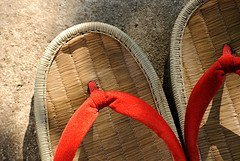Barbara Toboni: melding poetry and prose
I was first drawn to Barbara Toboni's work when we both contributed short memoirs to the 2011 anthology Wisdom Has a Voice: Every Daughter’s Memories of Mother, edited by Kate Farrell.
Barbara has an eye for just the right details to bring scenes to life, as well as a tender yet powerful way of conveying emotions in a simple turn of phrase. She and I have followed each other's blogs for the past few years, and I was delighted when she submitted her memoir vignette to Sisters Born, Sisters Found: A Diversity of Voices on Sisterhood.
1. Zori Sisters, the personal story you contributed to Sisters Born, Sisters Found, is situated in Guam. Did your family travel a lot when you were growing up? How much time did you spend outside of the United States? And how do you think living in more than one culture when you were young strengthened you? Were there any disadvantages you had to overcome? How has this experience informed your writing?
My family moved a few times in the United States before we left for Guam when I was 13. I was born in Pennsylvania, and we lived in Southern California—a couple different locations. Guam was, at that time, my only experience of living overseas. My father worked for the Civil Service there, and he signed on for two years. After the first two years, he fell in love with the island and continued to sign on for the rest of his life. I stayed in Guam for 12 years.
At first, there was a period of adjustment. I looked different and so felt awkward in school. I was jealous of the native girls with their long, straight hair in contrast to my frizzy bob. It took time to get used to the hot, humid weather. There were few phones on the island—imagine a teenager with no phone—and only one TV station in the late '60s. Without a phone, people dropped by at odd times, but eventually I fell in love with the island and all it had to offer a young girl growing up. There were the beaches, swimming and sailing, friends that taught me their bits of language, and invitations to village fiestas. The Chamorros, Guam’s native people, were very warm and kind to me.
The island is a mix of other cultures, too—mostly Filipinos, Japanese, and Koreans. Japanese tourists vacation in Guam, and I once worked at two different Japanese-owned hotels.As far as disadvantages in living on a small island, I missed some of the things going on back home like rock concerts. Few musicians traveled to Guam back then. Sometimes the slower pace seemed too slow. But, in general, Guam taught me to enjoy travel, and to be less judgmental of cultures other than my own. I’ve been to Mexico and Canada and would love to visit Europe one day.
Guam holds many memories for me. In 2010, my husband and I took a trip back there and when I returned home I started to compile poetry and short memoir vignettes about my years living on the island.
2. Zori Sisters is an excerpt from your book Water Over Time, which is a combination of stories and poems. What motivated you to use both forms in one book? Was it difficult to combine the two into a cohesive whole?
In my book, I was a little hesitant to combine both poetry and short prose, but all of it is memoir. Some stories didn’t communicate well into poetry and vice versa, but I knew all of it was a coming-of-age journey. I remember getting chills when we went to visit the village and saw the house my family first lived in. I took a picture of the house, a concrete shell of what it had been, but the island had suffered many storms. That picture was my motivation.
3. When I think of you, I think of poetry. When did you begin writing poetry? What motivated you to do it? Is there a poem you'd like to share here? If so, tell us a little about the poem you chose.
I began writing poetry at 16. I kept my poems in journals, and I was very secretive at first about them, but as I grew older, my family and friends encouraged me to share. I love language and playing with words.One of my first poems poses a question about God. I often wrote about what I didn’t understand. I still do.
The Spirit of Love
If the spirit of love is created by nature
And all of God’s creatures are blessed with his touch
Then why can’t we see this mystical image
The spirit of love and the creator of such
4. Why did you submit a story to Sisters Born, Sisters Found? As a contributing author, do you have any hopes for the book?
This is a great idea for an anthology—the notion that some women you meet are connected to you even though they don’t share your DNA. I hope the book helps women take a second look at their friends—and count on them and cherish them just as if they are related.
5. Where can people learn more about you and your work?
On my website: www.barbarasmirror.com I have two chapbooks available for purchase, and I write a post monthly on my blog.
* * *
(Zori photo above by Mari Uesugi, creative commons license.)




